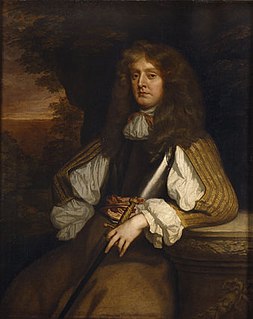Richard Standish (21 October 1621 – March 1662) was an English politician who sat in the House of Commons in 1659 and 1660. He was a colonel in the Parliamentarian army in the English Civil War.

The House of Commons of England was the lower house of the Parliament of England from its development in the 14th century to the union of England and Scotland in 1707, when it was replaced by the House of Commons of Great Britain. In 1801, with the union of Great Britain and Ireland, that house was in turn replaced by the House of Commons of the United Kingdom.

The English Civil War (1642–1651) was a series of armed conflicts and political machinations between Parliamentarians ("Roundheads") and Royalists ("Cavaliers") over, principally, the manner of England's governance. The first (1642–1646) and second (1648–1649) wars pitted the supporters of King Charles I against the supporters of the Long Parliament, while the third (1649–1651) saw fighting between supporters of King Charles II and supporters of the Rump Parliament. The war ended with the Parliamentarian victory at the Battle of Worcester on 3 September 1651.
Standish was the son of Thomas Standish of Duxbury, the MP for Preston and his wife Anne Wingfield, daughter of Sir Richard Wingfield of Letheringham, Suffolk. [1]
Thomas Standish was an English politician who sat in the House of Commons between 1640 and 1642. Standish was a zealous Parliamentarian.
He inherited the Manor of Duxbury and Duxbury Hall after the death of his elder brother Alexander in 1648. In 1654, he was elected Member of Parliament for Lancashire in the First Protectorate Parliament. He was re-elected MP for Lancashire in 1656 for the Second Protectorate Parliament. In 1659 he was elected MP for Preston in the Third Protectorate Parliament. [2] He was re-elected in March 1660 for Preston in the Convention Parliament, but the election was declared void on 20 June. [2]

Duxbury Hall was a 19th-century country house in Duxbury Park estate in Duxbury Woods, Lancashire that has been demolished.
Lancashire was a county constituency of the House of Commons of the Parliament of England from 1290, then of the Parliament of Great Britain from 1707 to 1800, and of the Parliament of the United Kingdom from 1801 to 1832. It was represented by two Members of Parliament, traditionally known as Knights of the Shire until 1832.

The First Protectorate Parliament was summoned by the Lord Protector Oliver Cromwell under the terms of the Instrument of Government. It sat for one term from 3 September 1654 until 22 January 1655 with William Lenthall as the Speaker of the House.
Standish died at the age of 40. He had married Elizabeth, the daughter of Piers Legh of Lyme, Cheshire, with whom he had six sons and three daughters. His son Richard was created a baronet in 1677. [1]


